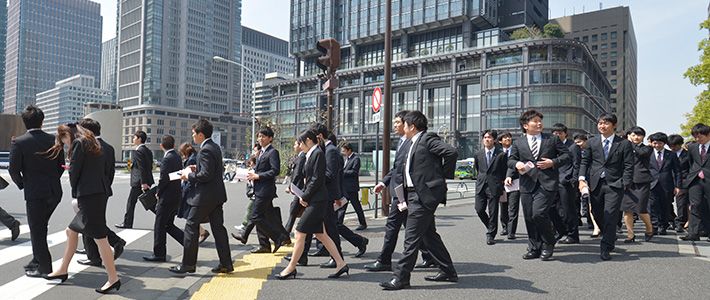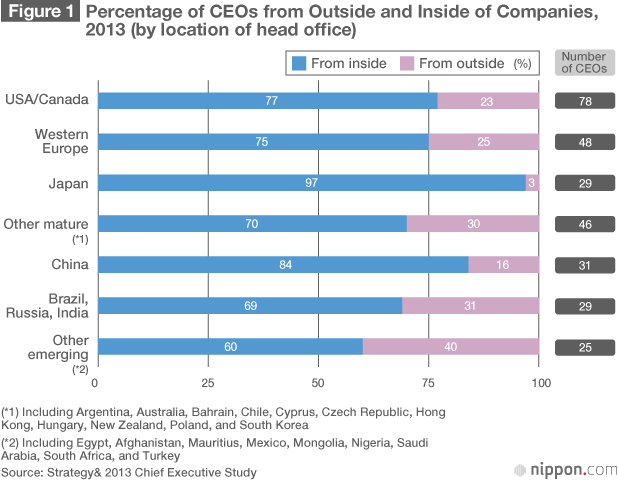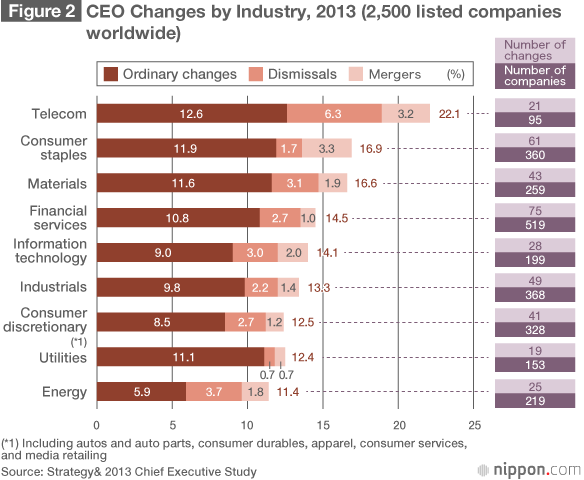
Will External Headhunting Help Japanese Companies Survive Global Competition?
Economy- English
- 日本語
- 简体字
- 繁體字
- Français
- Español
- العربية
- Русский
Outsiders Saved Near-Bankrupt Firms
While choosing chief executive officers from outside the firm is common in the United States and European countries, in Japan the practice has so far been limited to a few exceptional cases—salvaging a company on the verge of bankruptcy, for instance.
In 1999, when Nissan Motor was facing a crisis, the company invited Carlos Ghosn from Renault to become its CEO. Ghosn succeeded in turning around Nissan, which this year reported ¥112.1 billion in consolidated net income for the April–June quarter, up 36.7% from a year ago.
Japan Airlines, which used to call itself the national flag carrier, was on the brink of bankruptcy in 2010, when then Prime Minister Hatoyama Yukio persuaded Inamori Kazuo, chairman of Kyocera, to assume the chairmanship of JAL without pay. Inamori, renowned for his expertise as a corporate salvager, bailed out the company; in July this year JAL reported ¥26.9 billion in quarterly consolidated net income, more than double the income for the same period last year.
“Professional Executives” Drawing Attention
Since the turn of 2014, more big companies have followed suit, often selecting executives with wide international experience.
In April, long-established cosmetics manufacturer Shiseido announced plans to appoint Uotani Masahiko, former president and chairman of Coca-Cola (Japan), as its president. Then in June, Benesse tapped Harada Eikō, previously chairman of McDonald’s (Japan), to become its president and chairman. Harada is struggling to contain a customer data leak scandal that has shaken Japan’s leader in correspondence education.
Suntory followed in July, picking up Niinami Takeshi, former CEO of major convenience store operator Lawson and an alumnus of general trading house Mitsubishi. Niinami will be Suntory’s first president from outside the company’s founding family.
Fujimori Yoshiaki, president of leading housing and building equipment maker Lixil, previously served as president of the Japan unit of US-based General Electric, while Matsumoto Akira, chairman and CEO of snack food maker Calbee, was once head of the Japan unit of Johnson & Johnson, another US corporation.
Outsiders Still Rare in Japan
Japanese companies are still far less inclined to tap outsiders as top executives than their counterparts in other countries. A 2013 survey of 2,500 listed companies worldwide, released by US consulting company Strategy&, found that 97% of newly appointed CEOs in Japan were chosen from within the company, with just 3% coming from outside. By contrast, the ratio of CEOs chosen externally stood at 23% in the United States and Canada, 25% in Western European countries, and a full 40% in the category of “other emerging” countries including Egypt, Turkey, South Africa, and Mexico.


According to the 2013 survey, the average age of recently appointed CEOs in Japan was the highest in the world, at 61—much older than the global average of 53. Meanwhile, 37% of new CEOs in Japan had experience working abroad (as compared with the world average of 35%), up from 17% in the 2012 survey. However, only 2% of CEOs appointed by Japanese companies in the 2009–13 period were foreign nationals, as compared with the world average of 18%.
Japanese companies, once dominant in the world marketplace and known for their close attention to manufacturing quality, are facing harsh competition from newly industrializing countries in the global era. With lifetime employment and seniority pay systems becoming relics of the past, Japanese companies appear to have no choice but to choose new CEOs who are equipped to survive global competition, even if that means going outside the fold. The new hire’s dream of climbing the long ladder up to the top job now appears all but unattainable.
(Title photo: Newly hired graduates in Tokyo’s Marunouchi business district. © Jiji.)
▼Further reading
Japanese Companies Looking Outside the Fold for Executive Talent
Mori Kazuo
Shiseido Suntory Benesse Lixil Harada Eiko Niinami Takeshi Uotani Masahiko Fujimori Yoshiaki Matsumoto Akira